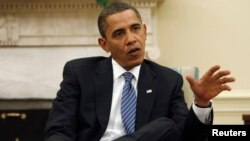THE WHITE HOUSE —
U.S. President Barack Obama says he has not yet made a decision about how to respond to what the United States sees as the use of chemical weapons in Syria, but he says that Washington has concluded that Syria's government carried out the attacks.
In an interview with the Public Broadcasting Service late Wednesday, Obama said he continues to have extensive discussions with his national security team and has received options from the military.
He said the U.S. has concluded that the government of President Bashar al-Assad on August 21 carried out an attack in a Damascus suburb, killing hundreds of people.
The president said the violation of an international norm against use of chemical weapons, in a volatile region, makes it necessary to respond.
"We have concluded that the Syrian government in fact carried these out and if that is so, then there need to be international consequences, so we are consulting with our allies, we are consulting with the international community. I have no interest in any kind of open-ended conflict in Syria, but we do have to make sure that when countries break international norms on weapons like chemical weapons that could threaten us, they are held accountable," said Obama.
The U.S. president was asked what a military strike, even a limited one, would accomplish.
He said that while it would not solve the problems in Syria, it would send a strong signal to the regime in Damascus.
"I think it's important that if in fact we make a choice to have repercussions for the use of chemical weapons, then the Assad regime which is involved in a civil war, trying to protect itself, will have received a pretty strong signal that in fact it better not do it again."
Obama reiterated U.S. readiness to work with anyone, including Syria's main ally Russia, toward a political transition and bring parties together to resolve the conflict.
The president, however, said Syria must understand that it cannot break international norms and standards of decency and create a situation in which U.S. national interests are affected.
Obama referred to the regional impact from the Syrian conflict, potential threats to U.S. allies and partners such as Turkey, as well as Israel and Jordan, and U.S. bases in the region.
The United States, he said, cannot permit a "breach of the non-proliferation norm" that could allow chemical weapons to fall into the wrong hands.
In an interview with the Public Broadcasting Service late Wednesday, Obama said he continues to have extensive discussions with his national security team and has received options from the military.
He said the U.S. has concluded that the government of President Bashar al-Assad on August 21 carried out an attack in a Damascus suburb, killing hundreds of people.
The president said the violation of an international norm against use of chemical weapons, in a volatile region, makes it necessary to respond.
"We have concluded that the Syrian government in fact carried these out and if that is so, then there need to be international consequences, so we are consulting with our allies, we are consulting with the international community. I have no interest in any kind of open-ended conflict in Syria, but we do have to make sure that when countries break international norms on weapons like chemical weapons that could threaten us, they are held accountable," said Obama.
The U.S. president was asked what a military strike, even a limited one, would accomplish.
He said that while it would not solve the problems in Syria, it would send a strong signal to the regime in Damascus.
"I think it's important that if in fact we make a choice to have repercussions for the use of chemical weapons, then the Assad regime which is involved in a civil war, trying to protect itself, will have received a pretty strong signal that in fact it better not do it again."
Obama reiterated U.S. readiness to work with anyone, including Syria's main ally Russia, toward a political transition and bring parties together to resolve the conflict.
The president, however, said Syria must understand that it cannot break international norms and standards of decency and create a situation in which U.S. national interests are affected.
Obama referred to the regional impact from the Syrian conflict, potential threats to U.S. allies and partners such as Turkey, as well as Israel and Jordan, and U.S. bases in the region.
The United States, he said, cannot permit a "breach of the non-proliferation norm" that could allow chemical weapons to fall into the wrong hands.





